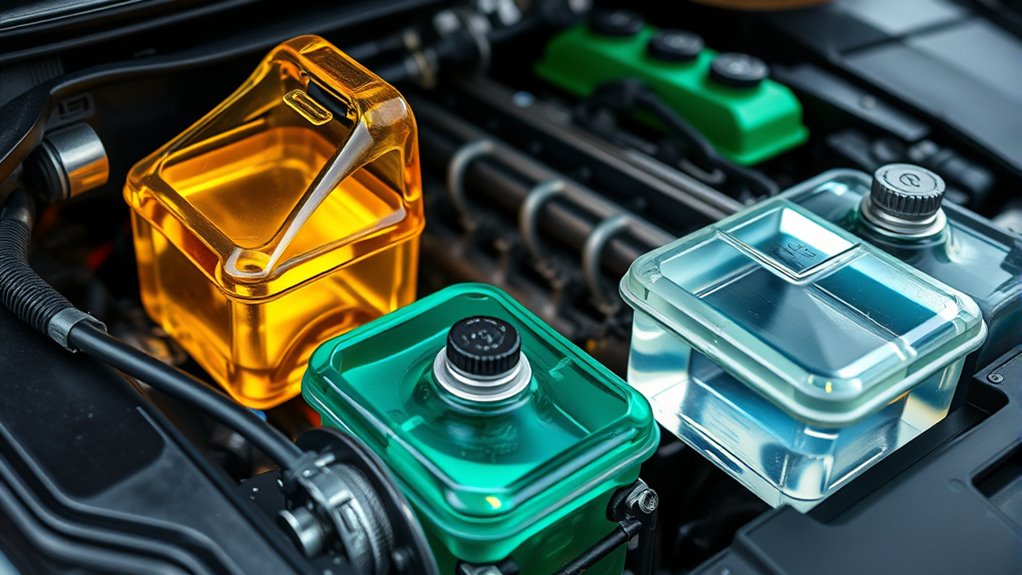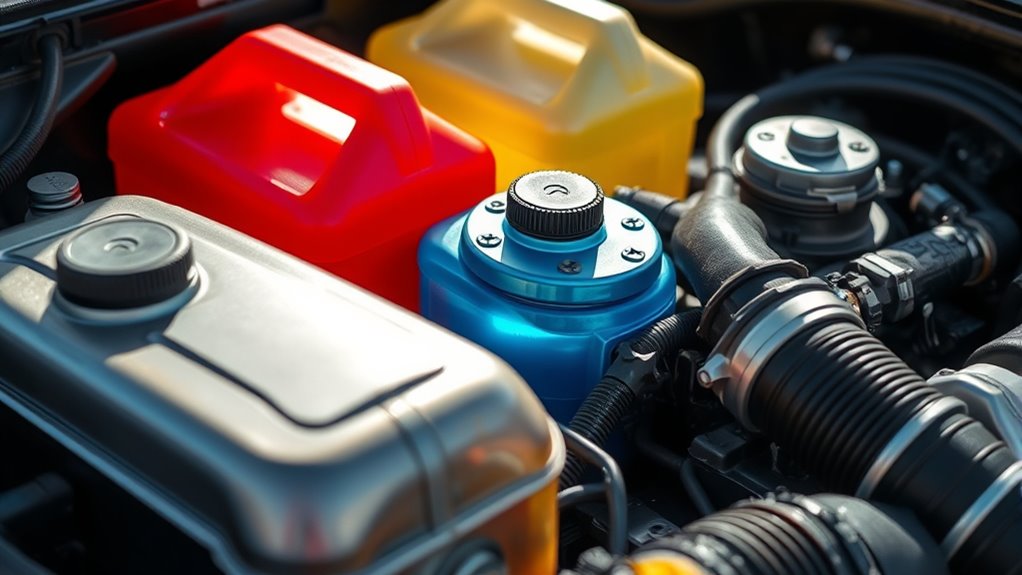Car fluids are essential for keeping your vehicle running smoothly and safely. Engine oil lubricates parts and prevents wear, while coolant regulates engine temperature to prevent overheating. Brake fluid transmits force to stop the car, and transmission and power steering fluids keep shifting and steering responsive. Regular checks and replacements are key to avoiding breakdowns and extending your vehicle’s lifespan. Keep these basics in mind, and you’ll find out more about keeping your car in top shape.
Key Takeaways
- Engine oil lubricates engine parts, prevents wear, and carries away heat to ensure optimal performance.
- Coolant regulates engine temperature by absorbing heat and preventing overheating, requiring regular checks for effectiveness.
- Brake fluid transmits force in braking systems, absorbs moisture, and needs routine replacement for safety and responsiveness.
- Transmission and power steering fluids enable smooth shifting and steering, with regular inspection preventing system damage.
- Consistent maintenance of all vehicle fluids extends engine life, improves efficiency, and enhances overall safety.

Have you ever wondered what keeps your car running smoothly? The answer lies in the essential role of car fluids, which work behind the scenes to ensure your vehicle operates efficiently. One of the most critical fluids is engine oil, which is responsible for engine lubrication. Without it, your engine parts would grind against each other, causing excessive wear and potential failure. Regularly checking and changing your engine oil is vital for maintaining optimal engine health. Proper fluid maintenance isn’t just about oil; it also involves managing other fluids like coolant, brake fluid, transmission fluid, and power steering fluid. Each plays a unique role in keeping different parts of your car functioning properly.
Engine lubrication through oil isn’t just about reducing friction; it also helps carry away heat, prevent corrosion, and trap dirt and debris. When you neglect oil changes or ignore fluid levels, you risk engine overheating or parts wearing prematurely. Maintaining proper fluid levels and quality ensures your engine runs smoothly and efficiently, preventing costly repairs down the line. It’s a simple task that pays off by extending your vehicle’s lifespan and improving fuel efficiency. Additionally, using the right type of oil for your specific engine can further optimize performance and longevity.
Regular oil changes prevent engine wear, overheating, and costly repairs, extending your vehicle’s lifespan and boosting fuel efficiency.
Coolant, or antifreeze, is another crucial fluid that works to regulate your engine’s temperature. It circulates through the engine, absorbing heat and preventing overheating, especially during hot summer drives or heavy traffic. Without enough coolant or if it’s old and contaminated, your engine can quickly overheat, leading to serious damage. Regular checks and fluid top-offs help keep the cooling system in top shape.
Brake fluid is essential for your safety, transmitting force from your brake pedal to the brake pads. Over time, brake fluid can absorb moisture, which reduces its effectiveness and can cause corrosion inside brake components. That’s why it’s necessary to check brake fluid levels regularly and replace it as recommended by your vehicle’s manufacturer. Proper brake fluid maintenance ensures your brakes respond promptly and reliably when you need them most.
Transmission fluid and power steering fluid also require attention, as they facilitate smooth shifting and steering control. Low or contaminated fluids can cause sluggish performance or damage to these systems. By keeping all your fluids at the right levels and in good condition, you’re ensuring all these systems work harmoniously, providing a safer and more comfortable driving experience.
In short, paying attention to your car’s fluids is a simple yet vital part of vehicle maintenance. Regularly inspecting, topping off, and changing these fluids help prevent breakdowns, improve efficiency, and extend your car’s lifespan. Remember, fluid maintenance isn’t just routine; it’s a proactive way to keep your vehicle performing at its best. Proper fluid management also helps preserve engine components and optimize overall vehicle safety.
Frequently Asked Questions
How Often Should I Change My Car’s Transmission Fluid?
For transmission maintenance, you should check your vehicle’s fluid replacement intervals in the owner’s manual. Typically, it’s recommended to change your transmission fluid every 30,000 to 60,000 miles, but some vehicles can go longer. Regularly inspecting the fluid guarantees smooth shifting and prevents costly repairs. Don’t wait too long—sticking to these intervals helps keep your transmission healthy and your car running efficiently.
Can Different Types of Oil Be Mixed Safely?
When it comes to mixing different oils, you should always check oil compatibility first. Mixing different oils without considering compatibility can cause issues like reduced lubrication or damage. Generally, it’s safest not to mix unless the oils are of the same type and brand. Always refer to your vehicle’s manual or consult a mechanic. Avoid mixing oils unless you’re certain they’re compatible, ensuring your engine stays protected and runs smoothly.
What Are Signs of Coolant Leaks or Low Coolant Levels?
Oh, the joys of coolant leaks—your engine’s subtle cry for help. You might notice your radiator corrosion or see coolant discoloration, like a bad dye job. Overheating or a sweet smell under the hood? Those are signs you’ve got a leak. Keep an eye on your coolant level and watch for these clues; ignoring them is like ignoring a warning sign from your car’s health.
How Does Brake Fluid Affect Braking Performance?
Your brake fluid directly impacts your braking performance by maintaining the pressure needed for effective stopping. Proper brake fluid maintenance guarantees the braking system integrity, preventing brake failure or spongy pedal feel. If brake fluid becomes contaminated or low, braking response weakens, increasing safety risks. Regularly check and replace your brake fluid as recommended to keep your braking system functioning smoothly and reliably, ensuring you can stop safely whenever needed.
Are Synthetic Fluids Better Than Conventional Ones?
You might wonder if synthetic fluids are better than conventional ones. Synthetic advantages include better fluid stability, higher boiling points, and improved fluid compatibility, which can enhance your vehicle’s performance and longevity. These fluids resist breakdown and perform well under extreme conditions. While they often cost more, their durability and efficiency can save you money in the long run by reducing the need for frequent replacements.
Conclusion
Think of your car fluids as the lifeblood of your vehicle—without them, it’s like trying to run a marathon without water. I once ignored a small coolant leak, only to find myself stranded on the side of the road. Regularly checking and maintaining your fluids keeps everything running smoothly, just like a well-tuned orchestra. Remember, taking care of these essentials now prevents costly repairs later—your car will thank you.









